* You are viewing Posts Tagged ‘Digitization’
James Brown
July 14, 2010
Conferences and Workshops, Events, Project Updates
Tags: Communication, Databases, Digitization, Europe, History of Science, Networks, Royal Society, Samuel Hartlib, Seventeenth Century, Union Catalogue
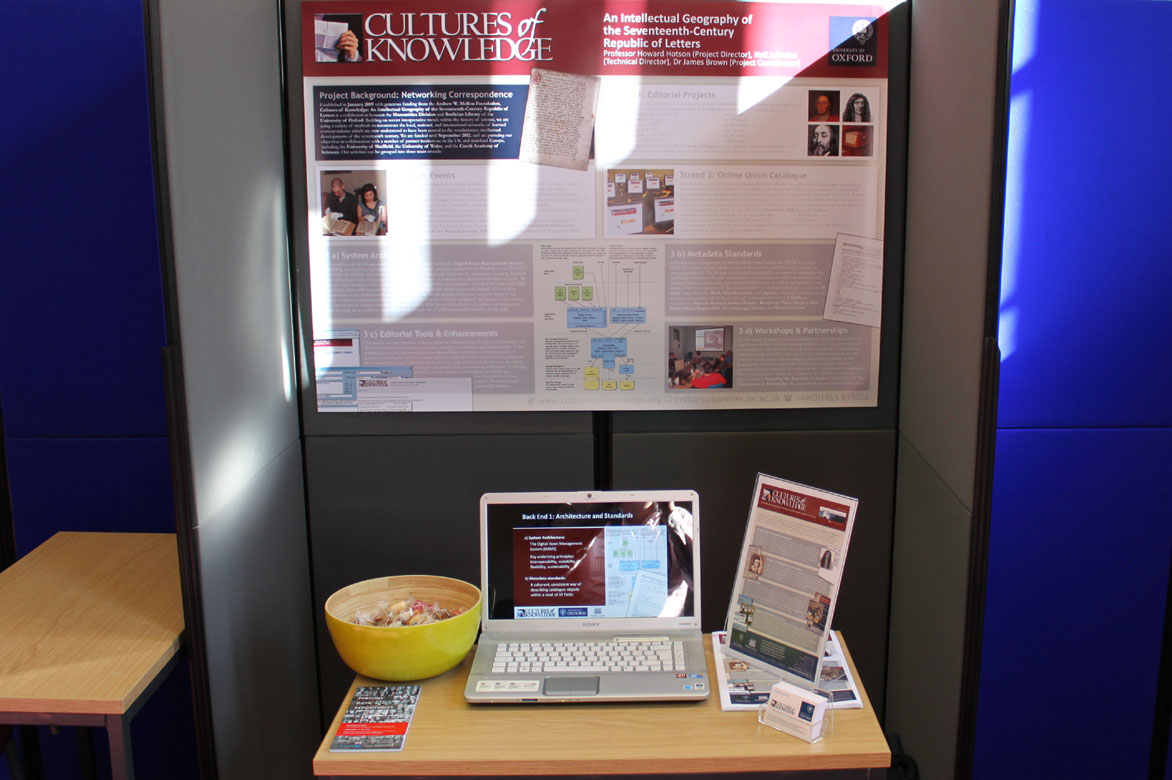
Our poster and stand at DH2010.
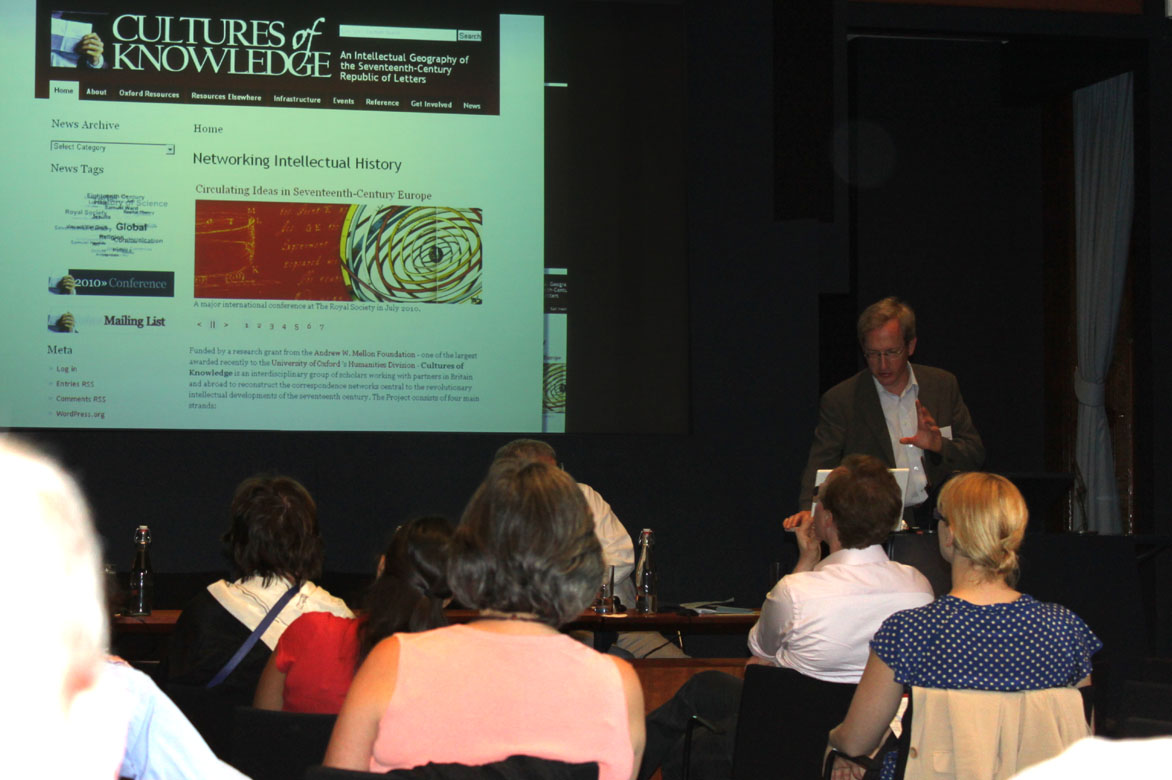
Presenting at the Royal Society.
Cultures of Knowledge headed to London last weekend as the Project Director and Coordinator braved thirty-degree metropolitan temperatures to share the Project’s research at two events. At Digital Humanities 2010, the flagship annual meeting of the digital humanities community hosted this year by King’s College London, we presented a poster, which focused mainly on our union catalogue and its technical underpinnings. We received very useful feedback and discovered and made connections with some highly complementary projects, including the initiative discussed below. Meanwhile, at the kind invitation of our collaborator Mark Greengrass, Howard Hotson co-delivered a keynote address at Circulating Ideas in Seventeenth-Century Europe: Networks, Knowledge, and Forms, a conference at the Royal Society organised by Ruth Connolly (University of Newcastle), Felicity Henderson (Royal Society), and Carol Pal (Bennington College). Building on Mark’s overview of Hartlib’s significance as an intelligencer and the trials and tribulations of the Hartlib Papers Project, Howard used a description of the place of Hartlib and his letters within Cultures of Knowledge as the basis for a more general overview of the Project and its aspirations, especially within the digital sphere.
Download the poster presented at DH2010
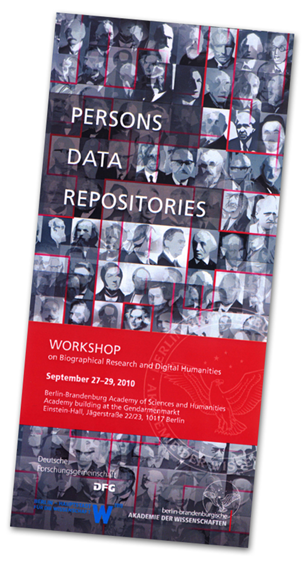 The challenge of describing, storing, and linking biographical and prosopographical information about historical actors and communities within a network environment is one faced by all digital correspondence projects. Fortunately, a workshop on Persons – Data – Repositories designed to explore these questions in detail will take place at the Berlin-Brandenbury Academy of Sciences on 27-29 September 2010. Organised under the auspices of the DFG project Person Data Repository, the event will discuss the development of tools and processes for handling person data which will enable both the automated merging of information while preserving a diversity of methods, an approach which requires both ‘cooperative and decentralized concepts’ and ‘new perspectives on data usage’ (connected in intricate ways to legal questions). For further information, including registration details, please see the workshop webpage.
The challenge of describing, storing, and linking biographical and prosopographical information about historical actors and communities within a network environment is one faced by all digital correspondence projects. Fortunately, a workshop on Persons – Data – Repositories designed to explore these questions in detail will take place at the Berlin-Brandenbury Academy of Sciences on 27-29 September 2010. Organised under the auspices of the DFG project Person Data Repository, the event will discuss the development of tools and processes for handling person data which will enable both the automated merging of information while preserving a diversity of methods, an approach which requires both ‘cooperative and decentralized concepts’ and ‘new perspectives on data usage’ (connected in intricate ways to legal questions). For further information, including registration details, please see the workshop webpage.
James Brown
June 23, 2010
Events, Lectures, Project Updates
Tags: Digitization, Europe, France, Isaac Casaubon, Joseph Justus Scaliger, Low Countries, Richard Thomson, Seventeenth Century
In the seventh and penultimate installment of the Project’s seminar series on Thursday 10 June, a large audience enjoyed papers by Dr Dirk van Miert (Huygens Institute) and Dr Paul Botley (Warburg Institute), both postdoctoral fellows on the Scaliger Correspondence Project, established by Professor Anthony Grafton. In his opening contribution, van Miert explored ‘The Seventeenth-Century Culture of Editing Scholarly Correspondences: The Case of Joseph Scaliger’. Via a fascinating case study of several early seventeenth-century editions of the correspondence of the French scholar (especially that prepared by Daniel Heinsius), he argued that in an early instance of the ‘institutionalisation’ of the Republic of Letters it was increasingly common for lavish printed editions of the correspondence of intellectuals to appear during or immediately after their lifetimes, often prepared by former students (Heinsius studied under Scaliger). In his concluding contribution, Botley switched the focus to two less high-profile denizens of the Republic of Letters in a paper entitled ‘The Letters of Isaac Casaubon (1559–1614) and Richard Thomson (c.1570–1613)’. Botley described his attempts to bring Casaubon’s c.2400 surviving letters (254 exchanged with Scaliger) to a wider scholarly audience by means of a definitive online edition, and introduced us to the letters of the little-known philologist and Church of England clergyman Richard Thomson, a regular correspondent of both Scaliger and Casaubon. Seminars take place in the Faculty of History on George Street on Thursdays at 3pm. For past seminars in the series, please see here.
 Podcast now available on the seminar page!
Podcast now available on the seminar page!
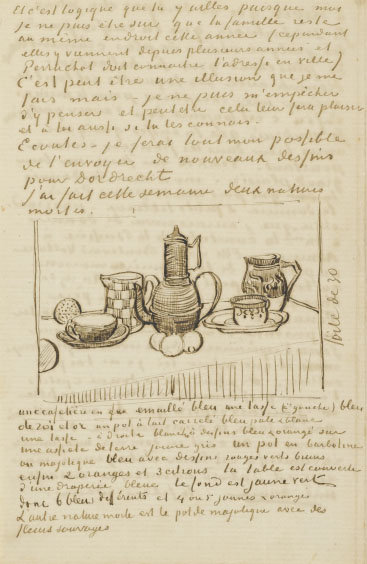
Detail of a letter from van Gogh to his brother. Arles, on or about 20 May 1888. (Van Gogh Museum, Amsterdam, b529 a-c V/1962).
A lecture on ‘The Letters of Vincent van Gogh: Book and Web Edition’ will take place at the Maison Française, Oxford on Wednesday 28 April at 4.30pm. Part of the Digital Humanities Seminar 2010, the event will showcase ‘Vincent van Gogh: The Letters’, which launched simultaneously as a six-volume book edition and scholarly web edition in October 2009 after fifteen years of research by the van Gogh Museum and the Huygens Institute. Two of the creators of the resource, Nienke Bakker (van Gogh Museum, Amserdam) and Peter Boot (Huygens Institute, The Hague), will discuss the genesis of the project, the depth and variety of the research, the importance of the letters both as an art historical source and as literature, and the rationale for publishing both a voluminous book edition and a free web edition. For further information, please see the lecture flyer. For the project website, please see www.vangoghletters.org.
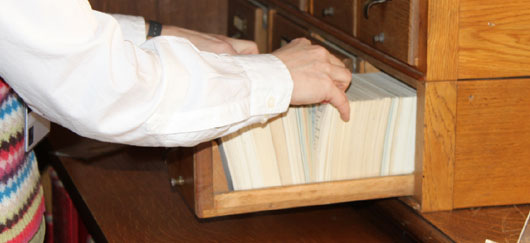
Exploring the hard copy index in the Selden End of Duke Humfreys Library in the Bodleian
We are delighted to announce that Dr Kim McLean-Fiander will be joining the Project as an Editorial Assistant. Kim will be working intensively with the digitized version of the Card Catalogue of MS Correspondence in the Bodleian Library (which will form an initial core of material for our union catalogue of seventeenth-century letters), proofing the keyed texts and bringing them into conformity with Project standards. Her academic research touches upon the intellectual networks of seventeenth-century women, while she has wide-ranging experience of cataloguing and editing at the Bodleian Libraries and at the Folger Shakespeare Library in Washington DC. For a full profile see here.

Testing the record-editing interface.

Comparing calendars.
Yesterday provided us with a valuable opportunity to bring individual CofK researchers together with OULS technical experts for a day of intensive training and consultation on various aspects of our nascent union catalogue of seventeenth-century intellectual correspondence. Scholars working on the Aubrey, Lister, Lhwyd, Hartlib, and Comenius collections explored the latest iteration of the pilot database; tested its online interface for the editing of letter records as well as our free-standing application for the collection of epistolary data; and compared individual calendars against each other as well as Project standards. The first version of the catalogue will be launched at the Universal Reformation conference, which will take place in Oxford on 21-23 September 2010.









 Join
Join 